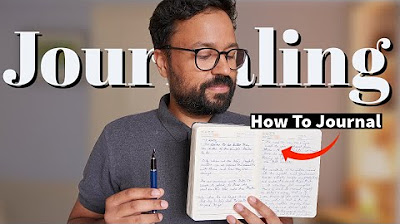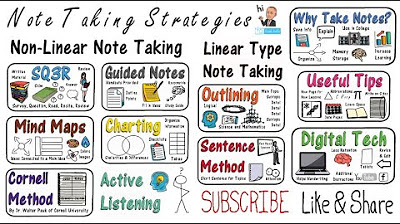Writing over Infinite Scrolling | Journal like a Scientist
Summary
TLDRThis script discusses the application of scientific methods to everyday life, emphasizing the importance of note-taking and journaling in personal growth. A PhD student shares insights on experiment logging, brain dumping, resource logging, and continuous logging to capture ideas and track progress. The speaker encourages reflection and sharing of knowledge gained, highlighting the transferability of scientific skills to daily life.
Takeaways
- 🔍 Scientists search for questions and answers, forming hypotheses to prove or disprove, a process that can be applied to life experiments.
- 📝 The importance of note-taking in the scientific process, as it helps capture insights from both successes and failures.
- 🧪 Experiment logging involves recording hypotheses, methods, results, and conclusions, which can be translated to life experiments for better learning.
- 📚 Keeping a dedicated lab notebook and a digital 'second brain' for jotting down thoughts and ideas about experiments.
- 🧠 The concept of a 'brain dump' to offload all thoughts, to-dos, doubts, and potential issues at the end of the day to prepare for the next steps.
- 🎨 Visual organization of thoughts and ideas can help in seeing connections and forming a mental map for problem-solving.
- 📚 Resource logging to document all resources used during a learning process, which can be beneficial for sharing knowledge and reinforcing learning.
- 📝 Continuous logging encourages real-time note-taking during experiments to capture fleeting ideas that may lead to breakthroughs.
- 🚴♂️ Ideas often come when not actively working, so it's important to capture them immediately, using tools like mobile apps for voice notes or dictation.
- 📓 Using pocket notebooks for specific experiments or problems can help in focusing and organizing thoughts, despite potential messiness.
- 🔄 Reflection moments, such as weekly reviews, consolidate notes and ideas, helping to identify patterns and track personal growth.
Q & A
What is the main idea the speaker is discussing in the transcript?
-The speaker is discussing the application of scientific methods of note-taking and journaling to everyday life, emphasizing the importance of documenting experiments, thoughts, and resources for personal growth and learning.
What are the three scientific methods of notetaking mentioned by the speaker?
-The three scientific methods of notetaking mentioned are experiment logging, brain dumping, and resource logging.
Why is it important to record both successful and unsuccessful experiments?
-Recording both successful and unsuccessful experiments is important because we often learn more from our failures than our successes, and it helps in understanding the learning process better.
What is the purpose of writing down the hypothesis, methods, results, and conclusions for an experiment?
-Writing down these sections helps in structuring the learning process, tracking progress, and reflecting on the outcomes, which can lead to better understanding and insights.
How does the speaker suggest using a digital notebook for notetaking?
-The speaker suggests using a digital notebook like Notion to have a dedicated place for thoughts and experiments, allowing for easy access and organization.
What is the concept of 'brain dump' as described by the speaker?
-The 'brain dump' is a process where all the thoughts, to-dos, doubts, and potential issues related to an experiment are written down, usually at the beginning or end of a workday, to clear the mind and organize thoughts.
Why is it beneficial to visually organize thoughts and ideas?
-Visually organizing thoughts and ideas helps in seeing connections between different concepts and problems, which can lead to a better understanding and potential solutions.
What does the speaker suggest for continuous logging during the learning process?
-The speaker suggests capturing ideas in real-time as they come up, using tools like mobile apps for quick notes or voice memos, to ensure no ideas are forgotten.
How can maintaining a dedicated notebook for a specific problem or experiment be helpful?
-Maintaining a dedicated notebook helps in focusing on a specific problem or experiment, keeping all related thoughts and ideas in one place for better organization and clarity.
What is the significance of weekly reflection in the scientific journaling process?
-Weekly reflection is significant as it allows for revisiting and consolidating notes, identifying patterns, tracking growth, and preparing for future experiments or learning.
Why is it important not to discard old ideas or thoughts during the reflection process?
-Old ideas or thoughts should not be discarded because they may become more valuable over time as perspectives change, and they can provide insights that were not initially apparent.
How does the speaker encourage sharing and reflecting on ideas with others?
-The speaker encourages sharing and reflecting on ideas with others, such as partners or friends, to gain different perspectives, discuss solutions, and enhance the learning experience.
Outlines

このセクションは有料ユーザー限定です。 アクセスするには、アップグレードをお願いします。
今すぐアップグレードMindmap

このセクションは有料ユーザー限定です。 アクセスするには、アップグレードをお願いします。
今すぐアップグレードKeywords

このセクションは有料ユーザー限定です。 アクセスするには、アップグレードをお願いします。
今すぐアップグレードHighlights

このセクションは有料ユーザー限定です。 アクセスするには、アップグレードをお願いします。
今すぐアップグレードTranscripts

このセクションは有料ユーザー限定です。 アクセスするには、アップグレードをお願いします。
今すぐアップグレード5.0 / 5 (0 votes)






